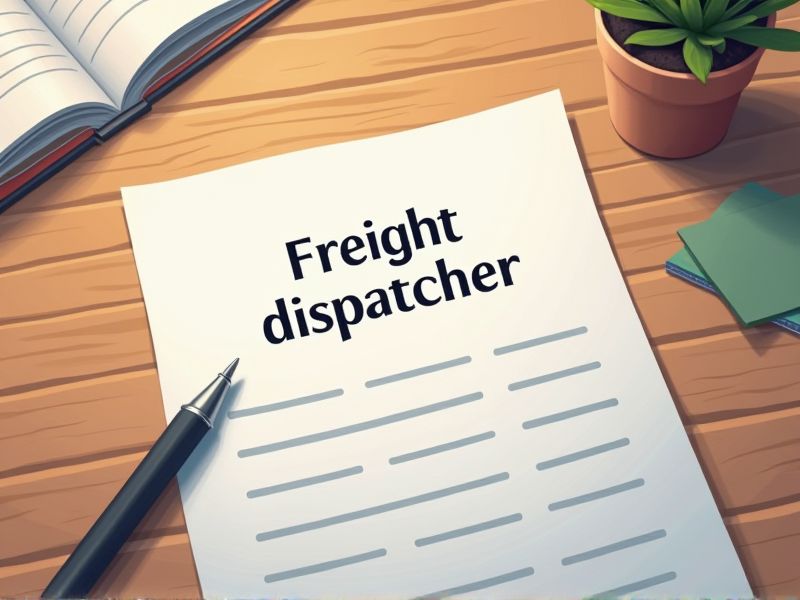
Freight dispatchers play a crucial role in managing logistics and ensuring the efficient movement of goods. Certifications equip them with skills in communication, coordination, and compliance with transportation regulations. These qualifications also enhance their understanding of logistics software and industry standards. Here are some key certifications beneficial for a freight dispatcher.
Freight Dispatcher Certification
Obtaining a Freight Dispatcher Certification can lead to increased credibility among clients, as it demonstrates a standardized level of competence. The certification process often covers industry regulations and best practices, which can reduce errors and improve efficiency. Learning formal skills through certification can enhance problem-solving abilities in complex logistics scenarios. Employers often prefer certified dispatchers, which can translate to better job opportunities and career growth.
Certified Transportation Broker (CTB)
Freight dispatchers benefit from having a Certified Transportation Broker (CTB) because it enhances their credibility with clients and carriers, potentially leading to more business opportunities. Knowledge from the CTB certification helps in understanding complex regulations and compliance issues, reducing the likelihood of costly legal troubles. The CTB credential often signifies a higher standard of industry knowledge, which can improve negotiation skills and operational efficiency. Having a CTB can differentiate a dispatcher in a competitive market, increasing trust with stakeholders and fostering long-term relationships.
Certified Dispatcher Professional (CDP)
Freight dispatchers play a crucial role in managing logistics and ensuring timely transportation, so a Certified Dispatcher Professional (CDP) credential ensures they possess the necessary skills and industry knowledge. This certification validates expertise in routing, scheduling, and communication, which reduces errors and transportation delays. A CDP designation can lead to enhanced trust with clients and partners, strengthening business relationships and reputation. With increasing regulatory requirements in logistics, the CDP credential keeps dispatchers informed and compliant, minimizing risks and legal complications.
FMCSA Safety & Compliance Certification
Freight dispatchers need the FMCSA Safety & Compliance Certification to ensure they adhere to federal regulations, minimizing the risk of legal penalties. This certification enhances operational efficiency by fostering an understanding of critical safety practices and compliance standards. By maintaining industry-standard practices, dispatchers reduce the chances of accidents and incidents during freight transport. Certification helps dispatchers build trust with carriers and clients, fostering business growth and partnerships.
Transportation Intermediaries Association (TIA) Certification
Gaining TIA Certification equips freight dispatchers with industry-recognized standards, enhancing their credibility and trustworthiness among clients and carriers. This certification ensures dispatchers are up-to-date with industry regulations and best practices, which reduces the risk of legal and compliance issues. Certified dispatchers often command higher fees and better job opportunities due to their validated skills and knowledge. The certification process itself provides valuable networking opportunities, fostering professional relationships that can lead to increased business growth.
Certified Logistics Associate (CLA)
The CLA certification provides a structured understanding of logistics processes, enhancing efficiency in freight dispatching. Knowledge gained from CLA helps dispatchers in optimizing route management, which directly reduces operational costs. Employers value certified professionals due to their demonstrated expertise, leading to a competitive job market edge for CLA holders. The certification instills confidence in clients about the dispatcher's capability to handle complex logistics scenarios effectively.
Certified Supply Chain Professional (CSCP)
Obtaining the CSCP certification helps freight dispatchers better understand the complexities of global supply chain management. This enhanced knowledge leads to improved logistics coordination, which reduces delays and optimizes routes. The certification instills advanced problem-solving skills that are crucial when dealing with unforeseen disruptions in freight operations. In turn, clients and companies are more likely to trust and rely on freight dispatchers who have a validated understanding of the supply chain process.
Lean Six Sigma Certification
Lean Six Sigma Certification enables a freight dispatcher to streamline operations by applying data-driven decision-making processes, reducing errors and delays. The certification fosters a culture of continuous improvement, leading to increased efficiency and cost savings in logistics management. Trained dispatchers with Lean Six Sigma skills are better equipped to identify bottlenecks and implement solutions that enhance service delivery. This certification helps dispatchers contribute more strategically to the company's competitive advantage by optimizing supply chain operations.
Hazardous Materials (HazMat) Certification
Hazardous Materials (HazMat) Certification is required for freight dispatchers to ensure they understand and comply with regulations governing the transport of dangerous goods. Knowledge from the certification minimizes the risk of accidents and environmental damage during the transportation process. It equips dispatchers with the skills needed to effectively communicate and coordinate with drivers, maintaining safety protocols. Freight companies benefit from certified dispatchers by reducing potential legal liabilities and improving operational efficiency in handling hazardous materials.
Transportation Management Certification
Freight dispatchers require Transportation Management Certification to enhance their knowledge of logistics operations, which improves their decision-making skills in route planning and load management. Obtaining the certification ensures compliance with regulatory standards, reducing the risk of legal penalties for dispatch errors. With certified training, freight dispatchers gain credibility and trust among clients and transportation partners, leading to increased business opportunities. Certification provides dispatchers with advanced tools and techniques to optimize fuel consumption and reduce operational costs, directly impacting profitability.
Summary
By obtaining certifications, you enhance your credibility and increase your marketability in the logistics industry. This often leads to higher job prospects and potentially greater earnings. Your certified expertise ensures better client trust and satisfaction due to demonstrated competence. Consequently, you may experience career growth and expanded professional opportunities.
